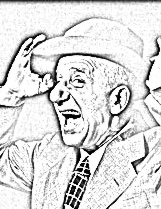David Rakoff
The grizzled, cigar chewing editor, who bore a striking resemblance to Parry White, as played by John Hamilton in the 1960's TV series The Adventures of Superman, slammed his hand down on his desk and groweled "Rakoff, go find me another David Sedaris!" Young David Rakoff spent the next month hiding behind stacks of over the transom manuscripts, for which it was his job to write polite rejection letters, wondering where he could find another diminutive, gay, jewish writer of amusing vignettes, who arrived in New York from the boonies with stars in his eyes, only to find himself cleaning houses for a living.
As the deadline approached he grew ever more desperate. Finally one Thursday night, Rakoff, who was cleaning his closet, rediscovered a manuscript which he had written himself, when he first arrived in New York from his native Canada. "Hey, I'm short, gay and Canadian. Why can't I be the next David Sedaris?" he thought to himself. He had been so hopeful, expecting to make it big as a writer, just like Garrison Keillor, except short, gay, Canadian and without a radio show. The next day he slipped his manuscript into the middle of a pile of mediocre over the transoms, and brought them to Parry's office. Take a look at these, chief. I think there might be a Sedaris in this stack.
On Monday morning Rakoff crept into the office, filled with trepidation. "Great Caesar's Ghost!" Cried the editor, "Bring me the author of this piece at once!" He was holding David Rakoff's manuscript in his huge, ham-like fist. "That's my work sir," said Rakoff. "Well son, you're fired! And now you are an author. Here's your $100,000 advance," said the editor with a smile.
This is not how David Rakoff became a published author, as far as I know. At any rate Half Empty is his third book, he did labor in the vineyards of publishing for several years and he now claims to make his living by sitting up in his room scribbling away with a no. 2 pencil.
David Rakoff's philosophy of life, main source of comedic material and raison d'etre appears to be the power of negative thinking. This despite surviving a childhood as a "big fag" and two (or was it three?) bouts with cancer as an adult. He says that being kvetchingly funny was, and is, a survival mechanism. Now he gets paid for it, just like Woody Allen.
Half Empty is a series of stories from Rakoff's life, or a very small volume in a long autobiography, built on the new Mark Twain plan, in which the author goes off on whatever topic strikes his fancy until exhausted and then takes another tack. I found it to be quietly chuckling funny in many places and soberingly touching in others. His stories are both tongue in cheek and sincerely real.
As to the question of whether he is another David Sedaris I can only quote the elf in the Christmas gift factory at the North Pole, in The Polar Express, which I watched with my daughter over the weekend: "What are they, mishugenah?"
This post is in the 60th
Published at Atticus Books.
**************************************
keywords: memoir, David Rakoff, non-fiction

